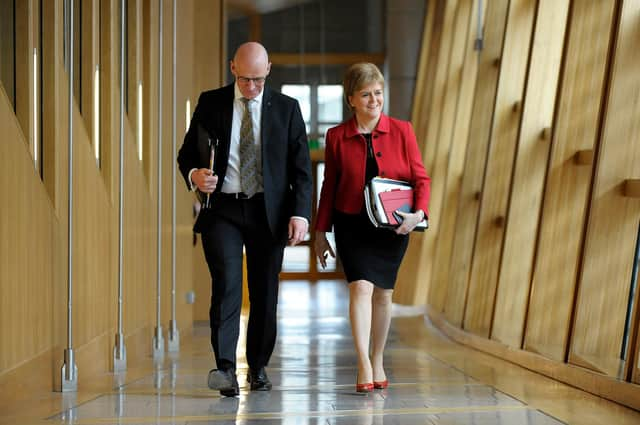Scotland's Covid inquiry crisis: SNP has no grounds for secrecy over legal team resignations – Brian Wilson


Bereaved relatives and others with an intense interest in obtaining answers are now aware that a huge implosion has taken place which throws the inquiry’s future into doubt.
But that is all they know, and everything else is left to rumour and speculation of which there is much. The fact no explanations have been offered is shameful and disrespectful.
Advertisement
Hide AdAdvertisement
Hide AdAccording to John Swinney, it was all very disappointing but, from the Scottish Government’s perspective, unembellished by complication. Lady Poole sent an e-mail, he spoke to her and she “intimated to me her decision to step down for personal reasons”.
So far, so straightforward. But then, under questioning, Mr Swinney added: “In the course of that call, she indicated to me that four members of counsel had resigned from the inquiry the previous day. That was news to me, as were the circumstances that led to Lady Poole’s resignation, when I heard it on Friday morning.”
At this point, matters become more complicated. While it may, taken alone, be none of anybody’s business why Lady Poole resigned, it is a matter of wholly legitimate interest why four members of her team, including lead counsel, also pulled out, and did so on the day prior to the judge’s email.
There is a clear public right to know if there is a linkage between the two (or five) events. It is entirely reasonable to seek an answer to the obvious question of whether “the circumstances that led to Lady Poole’s resignation” included the departures which preceded her email. Can Mr Swinney really dispute that?
Well, of course he can. In briefing party leaders and when news of Lady Poole’s departure became public, there was no mention of the four other resignations. In other words, an extremely incomplete picture was presented by the Scottish Government which, inevitably, tempered the response.
When challenged at Holyrood, Mr Swinney took refuge repeatedly in section 17 of the Inquiries Act of 2005 which, he said “gives an inquiry chair alone, rather than ministers, responsibility for deciding how an inquiry should operate. That includes the approach to taking evidence and engaging with stakeholders”.
Anyone looking at section 17 of the said Act might conclude that Mr Swinney’s interpretation imposes restrictions upon himself which are far from obvious.
It says “the procedure and conduct of an inquiry are to be such as the chairman of the inquiry may direct”; that he or she “may take evidence on oath, and for that purpose may administer oaths”; and “in making any decisions… must act with fairness and to avoid any unnecessary cost”.
Advertisement
Hide AdAdvertisement
Hide AdSwinney’s insistence that these words create a blanket ban on telling anyone what is going on stretches credulity.
Pressed by Labour’s Jackie Baillie to “agree it is the Scottish Government’s responsibility to ensure that the inquiry system works and is adequately resourced”, Mr Swinney replied primly that she wanted him “to break the law, because she invites me to interfere in the running of the inquiry”.
No she didn’t. She asked for assurances the mechanisms and personnel are in place for there to be an inquiry, according to some reasonable timescale and equipped to provide answers which so many are entitled to. I can find nothing in the fabled section 17 which precludes a factual statement in dramatically changed circumstances.
Indeed, there is an equal argument for disclosure if there is indeed no fire generating the smoke; just a series of coincidences. Why, if that is the case, not spell it out?
This latest example of chronic inability for any form of inquiry to get to the bottom of anything in Scotland will inevitably invite the conclusion: “Why bother trying?” That serves only those who prefer a culture of non-accountability.
The Covid inquiry is far too important to fail and there is an urgent moral requirement for someone to make a clear statement on recent events. There is nothing in section 17 which makes that impossible.
Comments
Want to join the conversation? Please or to comment on this article.

